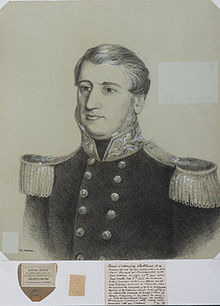Willoughby Shortland
|
Commander Willoughby Shortland RN |
|
|---|---|

Portrait of Willoughby Shortland drawn by his niece.
|
|
| 1st Colonial Secretary of New Zealand | |
|
In office 3 May 1841 – 31 December 1843 |
|
| Governor | William Hobson |
| Personal details | |
| Born |
30 September 1804 Plymouth, Devonshire, England |
| Died | 7 October 1869 (aged 65) Courtlands, Devonshire, England |
| Spouse(s) | Isabella Kate Johnston |
| Relations | Edward Shortland (brother) |
| Occupation | Royal Navy, colonial administrator |
Commander Willoughby Shortland RN (30 September 1804 – 7 October 1869) was a British naval officer and colonial administrator. He was New Zealand's first Colonial Secretary from 1841, after having arrived in New Zealand with Lieutenant Governor William Hobson in January 1840. He was later President of the island of Nevis and then Governor of Tobago.
Shortland, born in 1804, was the son of Captain Thomas George Shortland. His brothers were Edward Shortland and Peter Frederick Shortland. Willoughby was educated at the Royal Naval College, and entered the service on 9 January 1818. Being gazetted a lieutenant on 18 August 1828, he served in Galatea, 42 guns, and in the following year in Ranger, 28 guns, on the Jamaica station. His first command, in 1830, was the schooner Monkey. From her, on 21 March 1831, he took command of Skipjack, a schooner of 5 guns, and in her remained in the West Indies until June 1833.
On 1 July 1864 he was gazetted a retired commander in the navy.
In 1839 he accompanied Captain William Hobson, the first governor of New Zealand, to that colony, which had not then been annexed by England. Lieutenant Shortland was appointed colonial secretary and a magistrate. An early court case related to the murder of European shepherd (Patrick Rooney) by Ngāpuhi known as Kihi, who was discovered and delivered up by other Ngāpuhi to the authorities at Kororareka. Shortland was in the act of a magisterial examination of the charge against Kihi on 20 April 1840 when Haratua, a chief arrived with about three hundred armed warriors and began a haka. Shortland, believing the warriors had hostile intentions, sent for the troops. Edward Marsh Williams, who was present as a witness and who spoke Māori and understood Māori culture identified that Haratua and the warriors did not have any hostile intentions, having come over to make a public display of their abhorrence of the murder. Edward Williams persuaded Haratua and the warriors to leave and explained in a quiet way that it was ignorance of Māori culture on Shorthand's part that made him call for the troops.
...
Wikipedia
